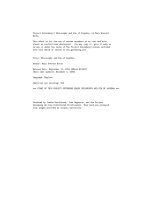Project Gutenberg''''s Penguin Persons & Peppermints, by Walter Prichard Eaton docx
Bạn đang xem bản rút gọn của tài liệu. Xem và tải ngay bản đầy đủ của tài liệu tại đây (1.19 MB, 526 trang )
Project Gutenberg's Penguin Persons &
Peppermints, by Walter Prichard Eaton
This eBook is for the use of anyone
anywhere at no cost and with
almost no restrictions whatsoever. You may
copy it, give it away or
re-use it under the terms of the Project
Gutenberg License included
with this eBook or online at
www.gutenberg.org
Title: Penguin Persons & Peppermints
Author: Walter Prichard Eaton
Release Date: August 23, 2008 [EBook
#26405]
Language: English
*** START OF THIS PROJECT GUTENBERG EBOOK
PENGUIN PERSONS & PEPPERMINTS ***
Produced by Chrome, Michael Ciesielski,
Irma Spehar and
the Online Distributed Proofreading Team
at
P E N G U I N
P E R S O N S &
P E P P E R M I N T S
BY
WALTER PRICHARD
EATON
Essay Index Reprint Series
BOOKS FOR LIBRARIES PRESS
FREEPORT, NEW YORK
First Published 1922
Reprinted 1969
STANDARD BOOK NUMBER:
8369-1288-8
LIBRARY OF CONGRESS CATALOG CARD
NUMBER:
72-93335
PRINTED IN THE UNITED STATES OF AMERICA
To
My Little Sister
who was born just in time
to know the old, quiet ways of life
in their gentle decline—to
know and to love
them
Page
Author's
Foreword
ix
Penguin Persons 1
Spring Comes to
Thumping Dick
18
The Passing of
the Stage
Sundial
33
On Singing
Songs with One
Finger
41
The Immorality
of Shop-
windows
46
A Forgotten
American Poet
51
New Poetry and
the Lingering
Line
65
The Lies We
Learn in Our
Youth
77
The Bad
Manners of
Polite People
87
On Giving Up
Golf Forever
96
“Grape-Vine”
Erudition
108
Business Before
Grammar
114
Wood Ashes and
Progress
118
The Vacant
Room in Drama
128
On Giving an
Author a Plot
132
The Twilight
Veil
136
Spring in the
Garden
154
The Bubble,
Reputation
168
The Old House
on the Bend
180
Concerning Hat-
trees
184
The Shrinking of
Kingman's Field
189
Mumblety-peg
and Middle Age
209
Barber Shops of
Yesterday
229
The Button Box 234
Peppermints 239
Author's Foreword
It is not a little unfortunate that no one can
attempt the essay form nowadays, more
especially that type of essay which is
personal, reminiscent, “an open letter to
whom it may concern,” without being
accused of trying to write like Charles
Lamb. Of course, if we were ever accused
of succeeding, that would be another
story! There is, to be sure, no doubt that
the gentle Elia impressed his form and
method on all English writers who
followed him, and still reaches out across
a century to threaten with his high
standards those who still venture into this
pleasant and now so neglected field. Such
are the rigors of triumphant gentleness.
Still—and he would have been the first to
recognize the fact—it is rather unfair to
demand of every essayist the revelation of
a personality like Lamb's. Fundamentally,
all literature, even naturalistic drama, is
the revelation of a personality, a point of
view. But it is the peculiar flavor of the
essay that it reveals an author through his
chat about himself, his friends, his
memories and fancies, in something of the
direct manner of a conversation or a letter;
and he himself feels, in writing, a
delightful sense of intimacy with his future
readers. That Lamb was a master of this
art like no other, without a visible or
probable rival, hardly constitutes a reason
for denying to less delightful men and
gifted artists the right also to practice it, to
put themselves and their intimate little
affairs and idiosyncrasies into direct and
personal touch with such few readers as
they may find. For the readers of his
essays are the author's friends in a sense
that the readers of his novels or
dissertations, or the witnesses of his
plays, can never be. There will be no
story to hold them, no fictional,
independent characters, no ideas nor
arguments on high questions of policy.
There will be only a joint interest in the
minutiæ of life. If I like cats and
snowstorms, and you like cats and
snowstorms, we are likely to come
together on that mutual ground, and clasp
shadow hands across the page. But if you
do not like cats and snowstorms, why then
you will not like me, and we needn't bore
each other, need we?
The little papers in this volume, issued
from the peaceful town of Sewanee atop
the Cumberland plateau, between
Thumping Dick Hollow and Little Fiery
Gizzard Creek, have been written at
various times and places in the past fifteen
years, many of them while I still dwelt in
New York, and babbled o' green fields,
many before, and some few after, the
outbreak of the Great War. That War, you
will perhaps discover, finds in them no
reflection. It has been consciously
excluded, for though the world can never
be the same world again, as we are in no
danger of forgetting, there are some things
which even war and revolution cannot
change, such as the memories of our
childhood, the joy of violets in the Spring,
the delight in melody, the humor of small
dogs, the coo of babies. I have fancied we
are sometimes by way of forgetting that.
At any rate, of such matters, in hours when
he has no thought but to please himself, the
essayist chats, and shall chat in the happy
years that are to come again, or all our
bloodshed has been in vain. If, at the same
time, he chances to please an editor also,
and then to make a few friends who like
what he likes, smiles sympathetically at
what makes him smile, why, that is clear
again!
This author has been fortunate enough to
please several editors in the past, and to
all of them, who have given him
permission to reprint such papers in this
volume as have appeared in their
periodicals, he extends his gratitude. They
are specifically, the editors of The
Atlantic Monthly, Scribner's, House and
Garden, The Dial, Ainslee's, The Scrap
Book, The Boston Transcript and The
New York Tribune.
W. P. E.
Twin Fires,
Sheffield,
Mass.
After all, one knows so little about a man
from his printed works! They are the
gleanings of his thoughts and
investigations, the pick of his mind and
heart; and they are at best but an
impersonal and partial record of the
writer. Even autobiography has something
unsatisfactory about it; one feels the
narrator is on guard always, as it were,
and, aware of an audience cold and of
strangers, keeps this back and trims up that
to make himself more what he should be
(or, in some perverse cases, what he
should not be). But probably no man who
is worthy of attention sits down to write a
letter to a good friend with one eye on
posterity and the public. In his intimate
correspondence he is off guard. Hence,
some day, when he has died, the world
comes to know him by fleeting glimpses
as he was,—which is almost as near, is it
not, as we ever get to knowing one
another?—knows him under his little
private moods, in the spell of his personal
joys and sorrows, sees his flashes of
unexpected humor,—even, it may be, his
unexpected pettinesses Thus dangerous
and thus delightful is it to publish a great
man's letters.
Such letters were Ruskin's to Charles
Eliot Norton, which Professor Norton has
given to the world. No one can fail from
those letters to get a more intimate picture
of the author of Modern Painters than
could ever be imagined out of that work
itself, and out of the rest of his works
besides, not excepting the wonderful Fors
Clavigera; and not only a more intimate,
but a different picture, touched with
greater whimsicality, and with infinite
sadness, too. Not his hard-wrung thoughts
and theories, but his moods of the moment
—and he was a man rich in the moods of
the moment—tell most prominently here.
And with how many of these moods can
the Ordinary Reader sympathize! Again
and again as the Ordinary Reader turns the
pages he finds the great man under the
thralldom of the same insect cares and
annoyances which rule us all, until he
realizes as perhaps never before that poet
and peasant, genius and scribe, are indeed
one in a common humanity, and sighs, with
a lurking smile of satisfaction, “So nigh is
grandeur to our dust!”
One of the points of convergence
between Ruskin and the Ordinary Reader
which has appealed to me with peculiar
force occurs in a letter from London dated
in 1860. “When I begin to think at all,”
Ruskin writes, “I get into states of disgust
and fury at the way the mob is going on
(meaning by the mob, chiefly Dukes,
crown-princes, and such like persons) that
I choke; and have to go to the British
Museum and look at Penguins till I get
cool. I find Penguins at present the only
comfort in life. One feels everything in the
world so sympathetically ridiculous; one
can't be angry when one looks at a
Penguin.”
Why, of course one can't! It is absurdly
true, when one comes to think of it, this
beneficent influence of penguins, stuffed
penguins, at that, which cannot even
waddle. I dare say few readers ever
thought of this peculiar bird (if it is a bird)
in just that light before Mr. Ruskin's letter
came to view; I'm sure I never did. But
few readers will fail to recall at a first
reading of the words that picture of a
penguin which used to adorn the school
geographies, and presently will come to
them the old sensation of amusement at the
waddly fellow propped up on his
impossible feet, the smile will break over
their lips, and they will be one in mood
with Mr. Ruskin. They may affirm that of
course the author was only indulging in a
little whimsicality, and they may two
thirds believe it, as it is no doubt two
thirds true; but just the same, unless I am
much mistaken, the image of a penguin
will persist in their minds, as it persisted
in Ruskin's mind—else how did he come
to write of it in this letter?—and they will
be the better and the happier for the smile
it evokes, as Ruskin was the better and the
happier. Indeed, that letter was his
cheeriest for months.
For me, however, the image has not
faded with the passing of the mood, or
rather it has changed into something more
abiding. It has assumed, in fact, no less a
guise than the human; it has become
converted into certain of my friends. I now
know these friends, in my thoughts of
them, as Penguin Persons. I find they have
the same beneficent effect on me, and on
others around them, as the penguins on
Ruskin. I mean here to sing their praises,
for I believe that they and their kind (since
everyone enters on his list of friends, as I
do, some Penguin Persons) have, even if
they do not know it, a mission in the
world, an honorable destiny to fulfill.
They prevent us from taking life too
seriously; they make everything
“sympathetically ridiculous”; they are
often “as the shadow of a great rock in a
weary land.”
But, at the very outset, I would not be









